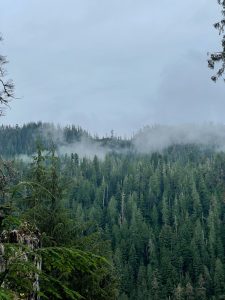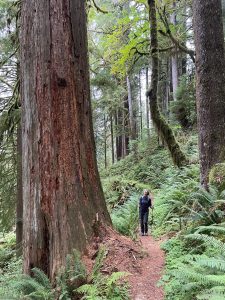 The Columbia City Yoga on-line Moving into Meditation class met this morning. We explored the relationship between our need for meaning and our capacities for love and wonder. Love and wonder can help us to meet life just as it is. Love and wonder can be a practices that help us to bear suffering and perhaps, one day, be free.
The Columbia City Yoga on-line Moving into Meditation class met this morning. We explored the relationship between our need for meaning and our capacities for love and wonder. Love and wonder can help us to meet life just as it is. Love and wonder can be a practices that help us to bear suffering and perhaps, one day, be free.
We drew inspiration from the Ten Percent Happier interview, Why Your Brain Turns the Miraculous Into the Mundane – and How to Fix It. This was a discussion between journalist and meditation teacher Dan Harris and poet and writer Maria Popova. Maria is a scholar and curator of texts on culture, science and what it is to be human. She and Dan explored how wonder can be a portal to meaning. Wonder is unconditional. Our capacity to love enables us to see each other as beings of wonder.
We heard Rosemerry Wahtola Trommer’s poem, Belonging. Since 2006, she’s maintained a poem-a-day practice. Since 2011, she’s posted those poems for all to enjoy.
The guided meditation is draws on the teachings of Roshi Joan Halifax, founder of Upaya Zen Center.
Welcome. Last week we remembered our dear friend Karl. We reflected on the loving kindness and welcoming he and Ellen offered our circle of friends over the years. Offering presence and caring expresses the wonder of being.
This week I heard a fascinating discussion about our experience of wonder. Our preoccupation with control and certainty can eclipse the light of every day miracles – that we are alive at all. The habitual nature of our lives can also lessen our experiences of joy. In her 10 Percent Happier interview with Dan Harris, poet and writer Maria Popova observed that joy becomes available by meeting life without expectation or judgment. She described this as:
Humans meeting reality on its own terms, not suffering over how you wish things were different or [with] the tyranny of should, which is the ultimate negation of reality. . . . Wonder . . . is just finding the things in reality as it is, [things] to be glad about, to be grateful for, to be delighted by.
She acknowledged our need for meaning making which she calls the “search for coherence.” This need springs from life’s uncertainty. She said:
We are matter, looking for meaning, which is hard because we are matter, which means an admission of our mortality. . . . How do we bear our mortality? I think wonder is the best way we have of doing that.
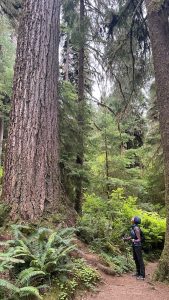 I’ve been reflecting on sources of wonder. When I experience wonder it seems to come with an awareness of life’s transience. It evokes joy, surprise and a sense of mystery. Sometimes it arises when I experience moral wonder – by that I mean expressions of love and caring, wise actions and choosing to accept and to trust. Moral wonder seems to survive our fearful instincts to control and separate ourselves.
I’ve been reflecting on sources of wonder. When I experience wonder it seems to come with an awareness of life’s transience. It evokes joy, surprise and a sense of mystery. Sometimes it arises when I experience moral wonder – by that I mean expressions of love and caring, wise actions and choosing to accept and to trust. Moral wonder seems to survive our fearful instincts to control and separate ourselves.
Maria acknowledged our need for meaning with compassion. She spoke about the relationship between wonder and meaning. She said
. . . wonder . . . presupposes the absence of story and meaning is a kind of story we tell ourselves about how things cohere. I think there is a way of stepping into wonder as a portal to meaning. Because wonder is a training of attention . . . our capacity to pay attention. Out of that capacity comes any experience of meaning we have. . . . . . . [Wonder] makes the meaninglessness bearable.
How do we meet life, how do we meet each other, without our stories, without our expectations and judgments? This comes into play even with the people we love – our family and friends. Maria talks about how we experience love. She said:
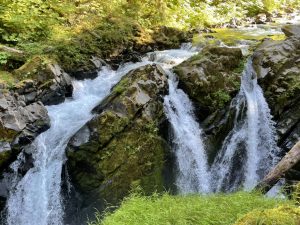 There are many things we mistake for love: need, longing, desire . . . all those other states are not a kind of unconditional presence with the other person. . . . Wonder is profoundly unconditional. . . .
There are many things we mistake for love: need, longing, desire . . . all those other states are not a kind of unconditional presence with the other person. . . . Wonder is profoundly unconditional. . . .
. . . the . . . purest form of love for another person [is] when I see them as a wonder and not as something there to meet my needs or fulfill my desires or fit into some preexisting template of what I think love should be. It’s clarifying . . . It’s so pure . . . when you feel that sense of wonder at a person or an experience or a thing.
Hearing this conversation prompted me to observe how I meet my closest love one – the one I’ve lived with for so many years. I remember meeting him in wonder. I often return to appreciating his wonder of being and yet most of the time find myself drifting away into stories – the most mundane ones like why can’t he close the kitchen cabinets? Or the serious ones around what we devote our time to. Maria spoke of this tendency to drift. She said:
. . . I think that’s the point in which you remember the cosmos that they are and that you change any one variable and it wouldn’t be the same person. You know, it’s like the human genome. We can’t really tinker with it because we don’t know how changing one gene will dismantle the whole cathedral of being. And so too, with the psyche of a person . . Sure you can have your spouse not be the loud chewing person in the car, but that wouldn’t be the person you fell in love with. That would be another person.
I really enjoy thinking of each of us as a cosmos! Beautiful, mysterious and wondrous. Every part belongs.
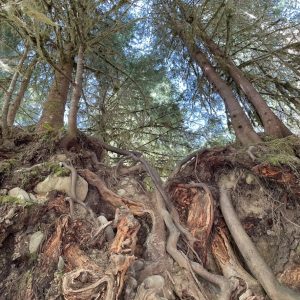 Here is Rosemerry Wahtola Trommer’s poem, Belonging:
Here is Rosemerry Wahtola Trommer’s poem, Belonging:
And if it’s true we are alone,
we are alone together,
the way blades of grass
are alone, but exist as a field.
Sometimes I feel it,
the green fuse that ignites us,
the wild thrum that unites us,
an inner hum that reminds us
of our shared humanity.
Just as thirty-five trillion
red blood cells join in one body
to become one blood.
Just as one hundred thirty-six thousand
notes make up one symphony.
Alone as we are, our small voices
weave into the one big conversation.
Our actions are essential
to the one infinite story of what it is
to be alive. When we feel alone,
we belong to the grand communion
of those who sometimes feel alone—
we are the dust, the dust that hopes,
a rising of dust, a thrill of dust,
the dust that dances in the light
with all other dust, the dust
that makes the world.
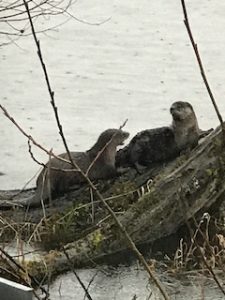 Let us practice together in this circle of inter-being in which we – at times – feel alone. I invite you to adjust your posture to support presence. Bring your attention to the body in an open way. Open to whatever is happening in the body: it could be excitation, fatigue or calm. Connect with the body that accompanies you from the first in-breath to the last out-breath. Our body. Our companion.
Let us practice together in this circle of inter-being in which we – at times – feel alone. I invite you to adjust your posture to support presence. Bring your attention to the body in an open way. Open to whatever is happening in the body: it could be excitation, fatigue or calm. Connect with the body that accompanies you from the first in-breath to the last out-breath. Our body. Our companion.
You might sense into those places of contact with Earth’s body. Those places that feel grounding. I invite you to cultivate a sense of connection with body, heart, breath and mind. A connection with where you are now.
Tune into breath in the body. Let the torso expand with the inhale. Notice if there’s any sense of resistance. See if you can invite that resistance to be a friend not a foe.
If it’s possible let there be a kind of uprightness that arises from this stability and connection. Can we uphold ourselves even in the midst of life’s uncertainty and wonder, life’s suffering and joy? What supports you in being with just this moment, being with whatever it’s giving you? Awareness and feeling of the breath in the body. Pausing to consider why you are here.
Our capacity to love is an extraordinary resource for each of us. It can be a resource that allows us to meet uncertainty and suffering within ourselves and also with that of others. Can you draw on love to help you to stay with whatever is happening in this moment?
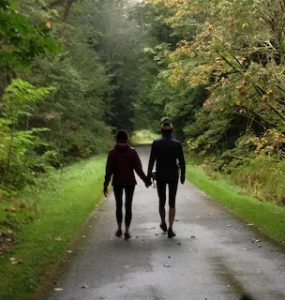 Can we draw on love that is born of our connection and inter-connection to help us survive the many losses that arise because we love? Love allows us to be with the many, many experiences of loss that living brings.
Can we draw on love that is born of our connection and inter-connection to help us survive the many losses that arise because we love? Love allows us to be with the many, many experiences of loss that living brings.
As Maria reminds us: “This openness to more — to truth beyond story, to beauty beyond certainty — is precisely what teaches us how to love the world more.”
We are conscious. We feel. We are as a blade of grass in an ever changing field.
What arises is already in the process subsiding. There is nothing to hold onto. We can let go. And still we realize joy and wonder. May we offer our love knowing we cannot control the course of life, suffering or death.
You might bring to mind someone you love. See them in your mind’s eye. Feel them in your heart. Can you see them as a wonder? A wonder that arises from the field of our inter-being. A wonder that is impermanent and yet lives as love your heart.
Can you see yourself as a wonder? Can you sense your inter-being in the field? You are because of so many loving connections.
Our actions are essential
to the one infinite story of what it is
to be alive. When we feel alone,
we belong to the grand communion
of those who sometimes feel alone—
we are the dust, the dust that hopes,
a rising of dust, a thrill of dust,
the dust that dances in the light
with all other dust, the dust
that makes the world.

